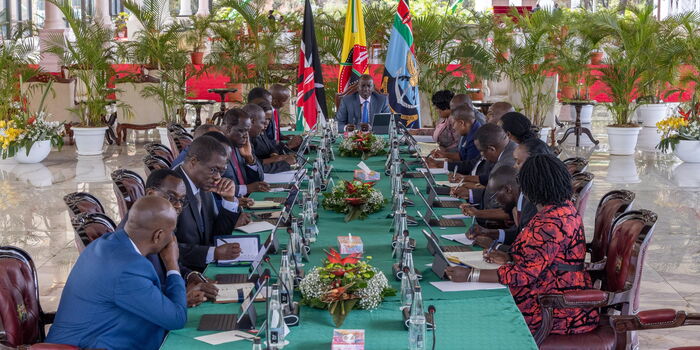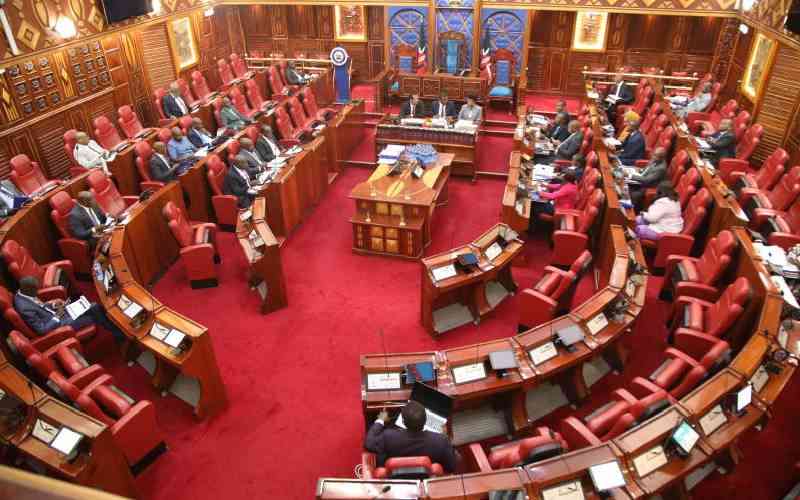EACC granted access to e-Government procurement system in fight against corruption
The Ethics and Anti-Corruption Commission (EACC) has secured full access to the government's new e-Government Procurement (eGP) system in what it describes as a game changer in the fight against procurement-related corruption.
Speaking during the 2025 Africa Anti-Corruption Day commemorations at the Kenyatta International Convention Centre (KICC), EACC Chief Executive Officer Abdi Mohamud said most corruption cases under investigation by the commission stem from irregular procurement deals, a problem the new eGP system is set to curb.
“From our experience, we have realised that major scandals happen because of fraudulent procurement. This online system will create a situation where there will be very little human contact as people will be dealing with systems providing all the information online,” Mohamud said.
“The good thing is that whenever we are doing investigations, we will just get information from the system, even the Auditor General is recognised and many other oversight agencies."
The CEO welcomed the direction the government is taking in enhancing transparency and urged Parliament to fast-track the Anti-Corruption (Amendment) Bill, 2025, which would provide the commission with greater power to verify wealth and seize unexplained assets held by public officers.
He also praised President William Ruto’s decision to return the Conflict of Interest (COI) Bill to Parliament for review, terming it a move that would significantly bolster the anti-graft war.
“We are very glad that the President, after realising that there were certain challenges with the COI Bill, returned it to Parliament. It is my belief that if Parliament agrees with the memo that was sent by the President, we are going to have a very good Bill that will not only address conflict of interest but also assist in identifying areas where there is need to investigate unexplained assets — because it will simplify the declaration of income, assets, and liabilities of public officers," he said.
He noted that, previously, declaration forms would be submitted but left unchecked: “That had been a problem in the past where you had agencies and public officers given the documents, throwing them somewhere without anybody bothering to take a look.”
EACC Chairperson Dr. David Oginde reiterated the importance of public participation in the war against corruption, with special focus on whistleblowing.
“Whistleblowing is key in the anti-corruption endeavours as it ensures that corruption, due to fear of reprisal, goes neither undetected nor unpunished,” Dr. Oginde said.
He, however, lamented the trust deficit between the public and government institutions, noting that it discourages many from coming forward with information, emphasising that fighting corruption protects resources meant to uplift citizens.
“We aim at protecting resources that will, in turn, ensure that every child has the opportunity to reach their full potential, that every family has access to basic necessities, and that every citizen is treated with fairness and respect,” said Dr. Oginde.
Former Attorney General Prof. Githu Muigai, who was the chief guest at the event, linked corruption to the erosion of fundamental rights.
“At its core, corruption is a direct assault on human dignity. It erodes the value, rights, and worth of individuals, especially the most vulnerable in our society,” Prof. Muigai said.
“Corruption is not just the theft of money; it is the theft of hope, the denial of dignity, and the erosion of citizenship. It tells people that who you know matters more than what you need. It says access to justice, jobs, or medical care depends on a bribe, not a right.”
Nominated Senator Crystal Asigi called for accountability and integrity in leadership, saying the tone from the top determines the country's ethical standards.
“A ship is not sunk because of the water around it, but the water in it. In successful countries, leaders leading by example have been and will always be the most powerful anti-corruption tool because when the tone is set by leadership, it will encourage the rest to follow,” she said.
She cautioned against authoritarianism disguised as leadership, saying, “If you look at a leader and say, this person is not running a nation, he is running an empire — that is usually the first sign of corruption, when leadership turns into dictatorship.”
“Light is not a particle; it is a wave. Just the way we pushed last year and things changed — that is the same way. We can’t sit back and think that someone over there is going to save us, so we push, and things will happen because that is the only way to fight corruption.”
Africa Anti-Corruption Day is marked annually on July 11 to reaffirm the continent’s commitment to eradicating corruption and promoting good governance.
You may also like...
Diddy's Legal Troubles & Racketeering Trial

Music mogul Sean 'Diddy' Combs was acquitted of sex trafficking and racketeering charges but convicted on transportation...
Thomas Partey Faces Rape & Sexual Assault Charges

Former Arsenal midfielder Thomas Partey has been formally charged with multiple counts of rape and sexual assault by UK ...
Nigeria Universities Changes Admission Policies

JAMB has clarified its admission policies, rectifying a student's status, reiterating the necessity of its Central Admis...
Ghana's Economic Reforms & Gold Sector Initiatives

Ghana is undertaking a comprehensive economic overhaul with President John Dramani Mahama's 24-Hour Economy and Accelera...
WAFCON 2024 African Women's Football Tournament

The 2024 Women's Africa Cup of Nations opened with thrilling matches, seeing Nigeria's Super Falcons secure a dominant 3...
Emergence & Dynamics of Nigeria's ADC Coalition

A new opposition coalition, led by the African Democratic Congress (ADC), is emerging to challenge President Bola Ahmed ...
Demise of Olubadan of Ibadanland
Oba Owolabi Olakulehin, the 43rd Olubadan of Ibadanland, has died at 90, concluding a life of distinguished service in t...
Death of Nigerian Goalkeeping Legend Peter Rufai

Nigerian football mourns the death of legendary Super Eagles goalkeeper Peter Rufai, who passed away at 61. Known as 'Do...




